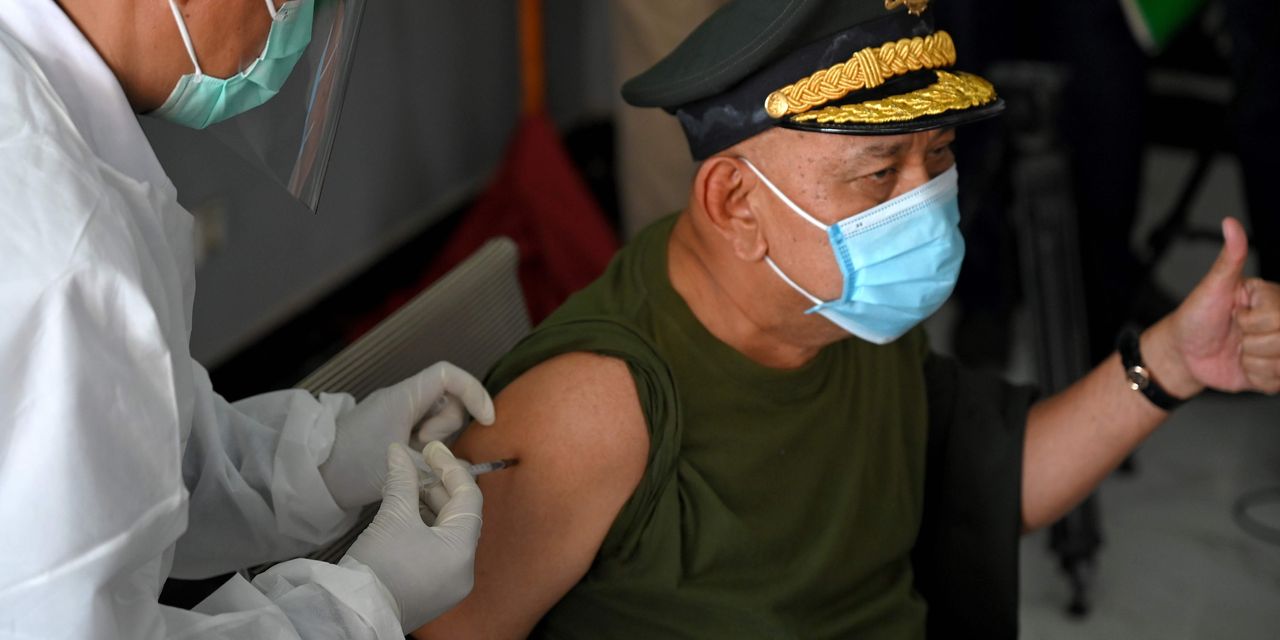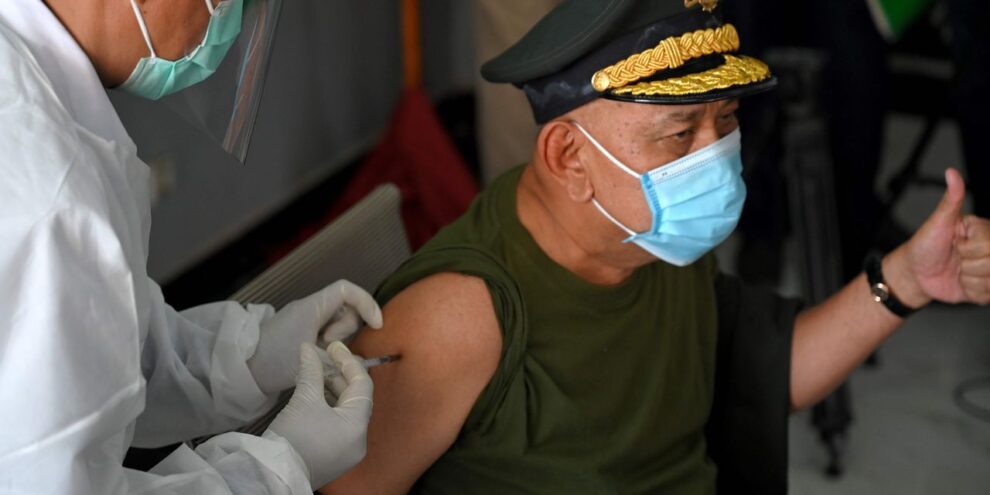
A member of the World Health Organization team that traveled to the Chinese city of Wuhan to investigate the origins of the coronavirus pandemic hit back at criticism of the mission from the U.S. State Department on Wednesday, suggesting the former U.S. administration was “disengaged” and out of touch.
Peter Daszak, a British zoologist and expert on disease ecology who is president of nonprofit EcoHealth Alliance, said in a tweet that President Joe Biden “has to look tough on China,” adding that U.S. intelligence could not be relied on given it was “frankly wrong on many aspects” under former President Donald Trump.
The WHO mission ended Tuesday without finding the source of the outbreak, although experts concluded it was “extremely unlikely” it came from a laboratory, as some conspiracy theorists, including Trump, have touted. Instead, they said it likely jumped to humans from an as yet-to-be identified animal.
Daszak said the team had worked hard under “the most politically charged environment possible,” given U.S. concern that China has not been fully open with information about the virus, which was first reported in late 2019 in Wuhan.
The tweet linked to a U.S. State Department comment that questioned the transparency of the mission and China’s cooperation with the WHO team.
See now: 9 pandemic trends that may stick around as part of our future routine
The news comes as the global confirmed case tally of the virus that causes the illness COVID-19 headed above 107 million and the death toll rose above 2.42 million, according to data aggregated by Johns Hopkins University.
The U.S. continues to lead the world by cases, at more than 27 million, and deaths, at 468,207, or about a fifth of the global total. The U.S. added 96,460 new cases on Tuesday, according to a New York Times tracker, and at least 3,167 people died. But cases numbers have been steadily declining and have averaged 108,144 a day for the past week, down 35% from two weeks ago. Tuesday marks a third straight day of fewer than 100,000 new cases.
Read now: CDC director: ‘Now is not the time to roll back the mask requirements’
There was bad news for California, however, when it became the state with the most COVID fatalities at 44,970 since the start of the pandemic. That is more than the 44,683 fatalities suffered by New York, which was a hotspot last spring at its peak.
Globally, the numbers are improving too, according to the WHO’s latest epidemiological update. There were 3.1 million new cases recorded last week globally, the update finds, down 17% from the previous week.
“Although there are still many countries with increasing numbers of cases, at the global level, this trend is encouraging,” said the WHO.
The agency continues to clamor for wealthier countries not to hog available vaccines, but to make sure they are also available to lower-income countries, a message it has been pushing heavily in recent weeks.
Of the 128 million vaccine doses administered so far, more than three quarters are in 10 countries that account for 60% of global GDP, according to a joint statement published Wednesday by UNICEF Executive Director Henrietta Fore and WHO Director-General Dr. Tedros Adhanom Ghebreyesus.
“As of today, almost 130 countries, with 2.5 billion people, are yet to administer a single dose,” said the statement. “This self-defeating strategy will cost lives and livelihoods, give the virus further opportunity to mutate and evade vaccines and will undermine a global economic recovery.”
The two agencies are calling on governments to share vaccines through the WHO’s Covax program, which aims to get shots in arms in the world’s poorest countries.
“We need global leadership to scale up vaccine production and achieve vaccine equity,” they said. “COVID-19 has shown that our fates are inextricably linked. Whether we win or lose, we will do so together.”
Read also: The COVID-19 vaccine gives America a chance to lead the world again — just keep Big Pharma out
In other news:
• Expect to get annual coronavirus shots for years to come, Johnson & Johnson CEO Alex Gorsky said Tuesday. “I think most people feel that this will be something where, for the next several years, we’ll be getting a COVID-19 shot, just like we would a flu shot,” Gorsky told CNBC in an interview . Mutations of the coronavirus will necessitate regular changes to vaccines. “Now exactly what that shot’s going to be comprised of, I don’t think we know today,” he told CNBC’s Meg Tirrell. “But I think we can all imagine a future where we’re living with this, but where we can keep the science at pace with the virus so that we can keep on living our lives.”
• BioNTech SE BNTX, +1.42% has started production at a new site in Germany, in a move that will help alleviate a shortage of supplies of the shot it has developed with Pfizer Inc. PFE, -0.48%, MarketWatch’s Lina Saigol reported. The factory will produce mRNA, the active ingredient in the shot, which will then be purified and concentrated, before being delivered to partner sites to be finished. “The first vaccines produced at the Marburg site are expected to be delivered at the beginning of April,” BioNTech said in a statement on Wednesday. The batch will need the approval of the European Medicines Agency.
• Travelers visiting the U.K. may face 10 years in prison if they lie about where they have been, as part of tough new rules aimed at combating the spread of COVID-19 in the country, Health Minister Matt Hancock announced. Travelers will be obliged to book through an online platform for a quarantine package costing £1,750 ($2,423) that will include the cost of a hotel, transport and testing. A fine of £1,000 ($1,378) would be imposed for failing to take a first test, and of £2,000 for anyone failing to take a second mandatory test.
• New Zealand has granted authorization to the Pfizer/BioNTech vaccine and will start administering it next week to front-line health care workers and airline staff, the Guardian reported. Authorities expect the Pfizer vaccine to arrive in the country by end-March but they had expressed concerns about export curbs. Pressure has been mounting on Prime Minister Jacinda Ardern to start inoculations for the country’s five million people soon even though New Zealand has virtually eliminated the virus.
• South Africa will start giving the unapproved vaccine developed by Johnson & Johnson JNJ, -0.15% to front-line health care workers starting next week, to study what protection it offers against COVID-19 and the new variant that has emerged in that country, the AP reported. South Africa stopped using the vaccine developed by AstraZeneca PLC AZN, -0.89% AZN, -1.13% and Oxford University earlier this week, because it has not proved effective in dealing with the new variant, which is far more infectious than the original virus. J&J has applied to the U.S. Food and Drug Administration for an emergency use authorization for its vaccine, which has a major advantage over vaccines already authorized in that it is a one-dose regimen. The other vaccines all require two doses set weeks apart.
Latest tallies
The global tally for confirmed cases of the coronavirus that causes COVID-19 climbed above 107 million on Wednesday, the Johns Hopkins data show, and the death toll climbed above 2.42 million. Almost 60 million people have recovered from the illness.
Brazil has the second highest death toll after the U.S. at 233,520 and is third by cases at 9.6 million.
India is second worldwide in cases with 10.9 million, and now fourth in deaths at 155,252.
Mexico has the third highest death toll at 168,432 and 13th highest case tally at 1.9 million.
The U.K. has 3.9 million cases and 114,066 deaths, the highest in Europe and fifth highest in the world.
China, where the virus was first discovered late last year, has had 100,492confirmed cases and 4,825 deaths, according to its official numbers.
What’s the economy saying?
The cost of U.S. consumer goods and services rose in January at the fastest pace in five months, largely because of higher gasoline prices. Inflation more broadly was still quite mild, however, MarketWatch’s Jeffry Bartash reported.
The consumer price index climbed 0.3% last month, the government said Wednesday. That matched the increase of economists polled by Dow Jones and The Wall Street Journal.
The rate of inflation over the past year was unchanged at 1.4%. Before the pandemic erupted, consumer inflation was running at a higher 2.3% clip.
Read: Small businesses turn more pessimistic despite vaccines, NFIB finds
“Though inflation remained moderate at the start of year, the opening up of the economy, the possibility of a bigger stimulus package making it through Congress, and shortages of inputs all point to warmer inflation in coming months,” said senior economist Jennifer Lee of BMO Capital Markets.
The Dow Jones Industrial Average DJIA, -0.14% and S&P 500 SPX, -0.32% opened higher Wednesday, then turned lower in morning trading.











Add Comment